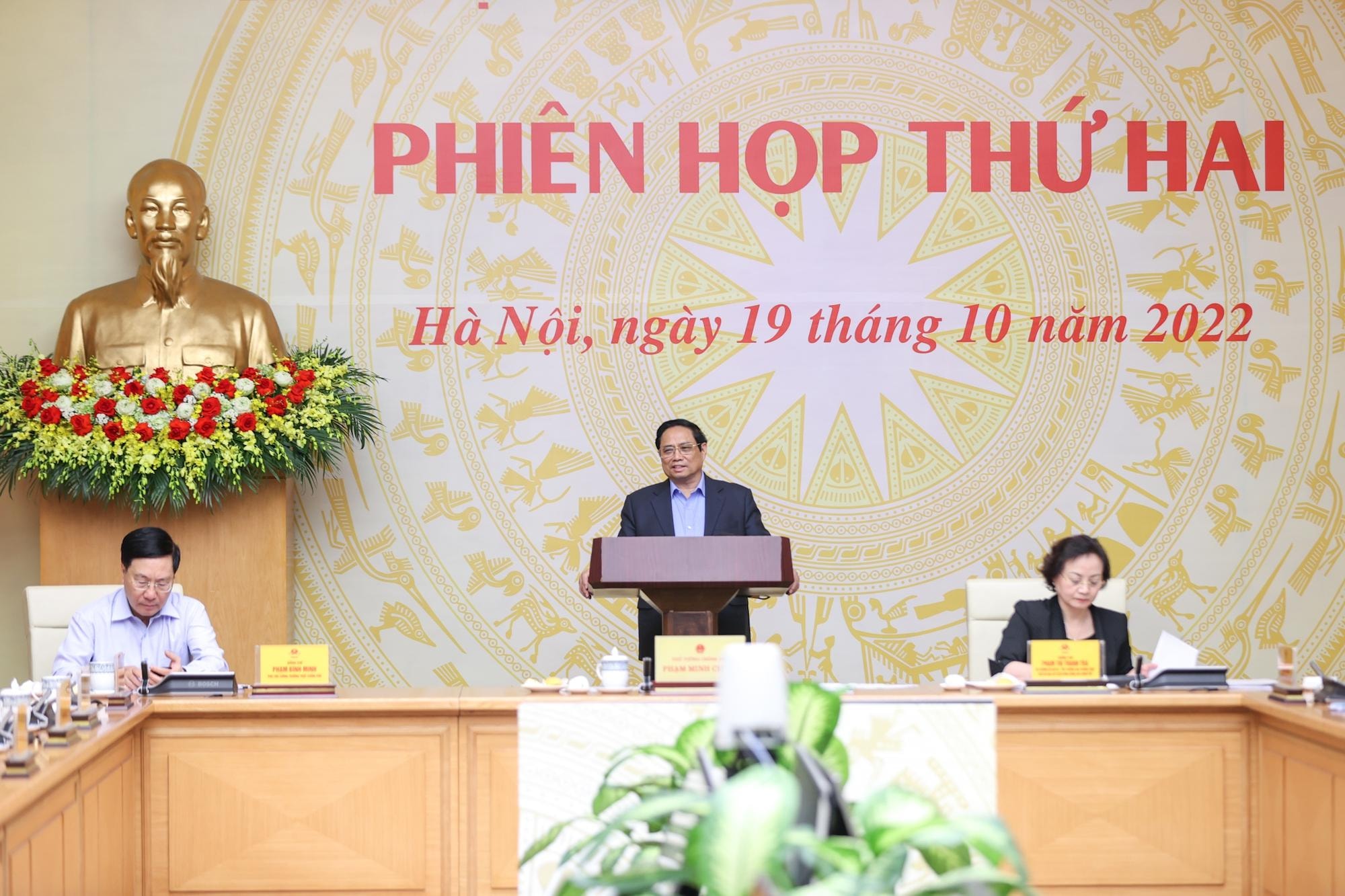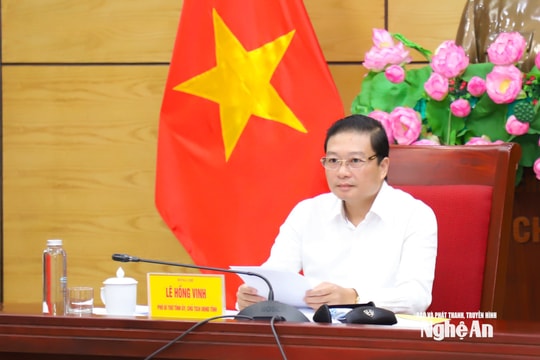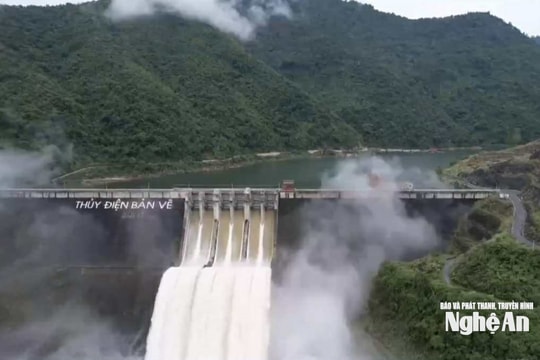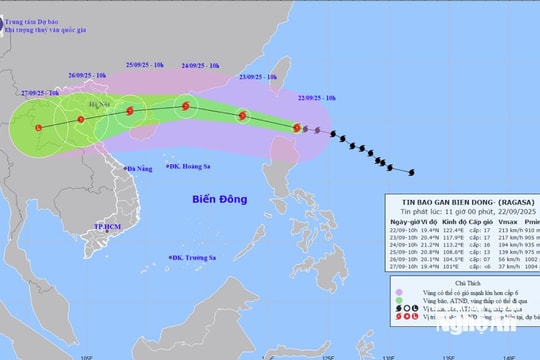Prime Minister Pham Minh Chinh: Do not waste time and effort on administrative procedures, irresponsibility and bureaucracy
Prime Minister Pham Minh Chinh emphasized that administrative reform is a heavy, difficult, complicated, and sensitive task, but no matter how difficult it is, it must be done to remove difficulties, overcome challenges, mobilize all resources for development, and not waste time and effort on administrative procedures, irresponsibility, and bureaucracy of public servants.
 |
The Prime Minister delivered a concluding speech at the second meeting of the Government's Steering Committee for Administrative Reform on the morning of October 19. Photo: VGP/Nhat Bac |
On the morning of October 19, Prime Minister Pham Minh Chinh - Head of the Government's Steering Committee for Administrative Reform, chaired the second meeting of the Steering Committee.
Also attending the meeting were: Deputy Prime Minister Pham Binh Minh, Minister of Home Affairs Pham Thi Thanh Tra - Deputy Head of the Steering Committee, Minister, Head of the Government Office Tran Van Son - Deputy Head of the Steering Committee, Minister of Construction Nguyen Thanh Nghi, Minister of Agriculture and Rural Development Le Minh Hoan; leaders of ministries, branches and central agencies.
Effective in all 6 aspects of work
Reports and opinions presented at the meeting stated that over the past 9 months, administrative reform has achieved positive and comprehensive changes in all fields, especially in building institutions, legal policies; reforming administrative procedures; arranging and streamlining the organization and staff; reforming the civil service regime, digital transformation...
Delegates unanimously assessed that administrative reform work in recent times has been focused on leadership and direction; actively and effectively implemented in all 6 aspects of work.
The first, the work of building and perfecting institutions and laws has received special attention, innovation and many changes. The Government and the Prime Minister have requested the heads (Ministers, Heads of sectors, Chairmen of Provincial and Municipal People's Committees) to directly lead and direct the work of building and perfecting institutions; strengthen human resources, and remove financial obstacles for this work.
The Government has organized 6 thematic meetings on law-making to discuss and give opinions on 30 draft laws, ordinances, and proposals for law-making. The Government and the Prime Minister have issued 96 normative documents (75 decrees, 21 normative decisions of the Prime Minister); many of which are related to production and business activities, contributing to supporting, restoring, and developing the socio-economy.
MondayAdministrative procedure reform and improvement of the business investment environment continue to be widely implemented, focusing on cutting and simplifying business regulations, enhancing decentralization of administrative procedure settlement and modernizing direction and management methods.
Reduced and simplified 657 business regulations in 73 documents; approved plans to reduce and simplify 183 regulations in 19 legal documents. Updated nearly 17,800 current regulations on the Business Regulation Consultation and Lookup Portal.
Approved the plan to decentralize the authority to handle 699/5,187 administrative procedures in 100 fields; issued a plan to review and simplify internal administrative procedures in the state administrative system for the 2022-2025 period.
11,700 one-stop departments at all levels nationwide were established (56 provincial-level public administrative service centers); 53/63 localities merged the Public Service Portal and the Electronic One-Stop Information System.
More than 4,000 administrative procedures provide online public services (over 61%) and complete integration, providing 21/25 essential public services under Project 06 to the National Public Service Portal.
Tuesday,The reform of the State administrative apparatus has been carried out strongly and drastically. As of October 15, a Decree on the organization of the apparatus of 11 ministries and agencies has been issued, which is expected to reduce many general departments, bureaus, divisions, and public service units. Ministries and branches have researched, proposed amendments, supplements, and issued new legal regulations related to decentralization and delegation of State management.
Wednesday,The reform of the civil service system has been promoted, especially in the work of building and perfecting institutions and streamlining the payroll. 02 decrees and 4 circulars related to policies for the team of cadres, civil servants and public employees have been issued; 3 draft decrees are in the process of being submitted for promulgation. Continue to streamline the payroll associated with restructuring and improving the quality of the team of cadres, civil servants and public employees; submit to the Politburo for approval to add nearly 66,000 teacher positions for the period 2022-2026, and have assigned nearly 27,000 teacher positions to address the shortage of teachers, ensuring the principle that where there are students, there must be teachers in the classroom.
Thursday,The construction and development of e-Government towards digital Government has achieved positive results. Many important documents have been issued (such as Decrees regulating the provision of online public service information by State agencies on the network environment, on electronic identification and authentication, etc.).
The national data integration and sharing platform continues to be completed, gradually connecting and sharing data between ministries, branches and localities. Modern information platforms and systems for directing, operating and serving people and businesses continue to be operated and developed (more than 15.2 million electronic documents were sent and received between State administrative agencies at all levels on the National Document Interconnection Axis; 1,350 electronic ballots to collect opinions of Government members were made on the Information System serving meetings and handling of Government work).
The system for monitoring the implementation of tasks assigned by the Government and the Prime Minister has been built and put into operation. National databases and specialized databases have been strongly deployed, especially the National Population Database, which has digitized and created nearly 100 million population data with personal identification numbers; issued more than 73 million electronic chip-embedded ID cards to citizens...
Need to regularly review and listen to opinions of people and businesses
In his concluding remarks, Prime Minister Pham Minh Chinh acknowledged, commended and highly appreciated the efforts of ministries, branches, localities, organizations and individuals, especially members of the Steering Committee, who have actively promoted the implementation of administrative reform with many positive results, contributing to rapid recovery and sustainable socio-economic development.
In addition, the Prime Minister pointed out the shortcomings and limitations in administrative reform. The direction of administrative reform has not been implemented resolutely in a number of ministries and branches. The progress of processing legal documents after review to remove institutional, mechanism and policy barriers in some places is still slow. The backlog of detailed regulations still exists and has not been completely resolved.
Administrative procedures in some areas are still cumbersome (especially those related to land, education, health, specialized inspection, import and export, etc.). The reduction and simplification of business regulations have not received due attention; many ministries and branches do not have plans to reform business regulations. The Prime Minister requested regular review, close monitoring, listening, and being receptive to comments, suggestions, and recommendations from people and businesses.
The connection, integration and data sharing between the National Public Service Portal, the Information System for handling administrative procedures at the ministerial and provincial levels with the national database, specialized databases as well as the digitization of records and results of handling administrative procedures are still slow.
Although there have been changes in the progress of disbursement of public investment capital and equitization of enterprises, it still does not meet the requirements.
 |
| The Prime Minister requested regular review, close monitoring, listening, and being receptive to comments, suggestions, and recommendations from people and businesses. Photo: VGP/Nhat Bac |
The rate of processing work documents in the electronic environment in some ministries and branches is still low. The coordination of ministries, branches and localities in connecting, integrating and sharing data information to serve the direction and administration of the Government and the Prime Minister is still limited. Discipline and order in performing public duties are not strict, and violations still occur.
Regarding the orientation of tasks and solutions for the coming time, Prime Minister Pham Minh Chinh requested all levels and sectors to identify administrative reform as an important and breakthrough step, which must be implemented strongly and synchronously at all levels and sectors on the basis of the viewpoint that investment in administrative reform is investment in development, with people and businesses at the center.
The Prime Minister emphasized: This is a heavy, difficult, complicated, and sensitive task because it affects people and organizations, but no matter how difficult it is, it must be done, because not doing it will hinder development, difficulties will not be resolved, and challenges will be difficult to overcome. The point of view is to lead, direct, operate, and organize implementation with high determination, great effort, drastic and effective action, finish each task, determined to resolve difficulties, overcome challenges to mobilize all resources for development, not to waste time and effort because of administrative procedures, irresponsibility and bureaucracy of public servants. In this difficult and challenging time, it is necessary to unblock resources, reduce input costs, administrative costs, and unofficial costs; everywhere, every field, every level, every industry must strive, make efforts, and contribute to this task.
8 key task groups that need to continue to be implemented
With that view, the Prime Minister requested ministries, branches and localities to focus on implementing a number of key tasks.
The first, carry out the remaining goals, contents and tasks of the year, including outstanding work and remaining tasks set out in the State Administrative Reform Master Program for the 2021-2030 period, and assigned in the 2022 Action Plan of the Steering Committee.
Members of the Steering Committee, heads of ministries, branches and localities must lead and direct resolutely to promote administrative reform; pay attention to arranging human resources and necessary resources and time; check, evaluate and draw lessons to do better each month, each quarter and the whole year; promptly direct issues arising from practice, answer and resolve difficulties and obstacles of localities in implementing administrative reform contents and tasks.
Second,timely institutionalize the Party's policies; fully and accurately concretize the provisions of the Constitution and laws; quickly put policies and laws into life and effectively implement them.
In particular, focus on advising and implementing the Strategy for building and perfecting the Socialist Rule of Law State of Vietnam until 2030, with a vision to 2045, after being issued by competent authorities. Regarding this task, the Prime Minister noted two contents: First, it is necessary to review and clearly define the functions, tasks, powers and competences of ministries, branches, units and localities; second, decentralize and delegate powers more clearly and specifically between the Government and ministries and branches, between ministries and branches and between ministries and branches and localities, along with improving the capacity of implementing officials, allocating resources appropriately, strengthening inspection, urging, supervising, controlling power, and timely and strict rewards and discipline.
The Prime Minister also requested to seriously implement the law and ordinance development orientation of the 15th National Assembly term and the Law and Ordinance Development Program in 2022. Focus on researching, reviewing, amending and supplementing current legal regulations to handle newly arising practical issues that need to be adjusted to remove obstacles in mechanisms and policies, creating favorable conditions for socio-economic development. Improve the quality of appraisal and promulgation of legal documents, ensuring consistency and feasibility; promptly promulgate detailed regulations and instructions for the implementation of laws, ordinances and resolutions.
Third,Urgently and focused on implementing 59 tasks, groups of tasks, and key solutions to strongly reform regulations and administrative procedures, improve the investment and business environment, and modernize the direction and management methods according to Resolution 131/NQ-CP dated October 6, 2022; Project on innovation in implementing the one-stop shop and inter-connected one-stop shop mechanism in handling administrative procedures in the 2021-2025 period; Program on reducing and simplifying regulations related to business activities in the 2020-2025 period (Resolution No. 68/NQ-CP dated May 12, 2020).
The Prime Minister noted that the tasks that need to be completed immediately include immediately implementing plans to reduce and simplify regulations related to business activities and the decentralization plan in handling administrative procedures approved by the Prime Minister; ministries that do not have plans must urgently complete them and submit them to the Prime Minister. Continue to implement the Plan to review and simplify internal administrative procedures for the period 2022-2025. Update fully, accurately, publicly, promptly and conduct consultations on regulations and plans to reduce and simplify regulations related to business activities on the Business Regulation Consultation and Lookup Portal.
In December 2022, complete the standardization of administrative procedure settlement results on the National Database on Administrative Procedures; organize and perfect one-stop departments at all levels, and deploy the Brand Identity System.
Speed up the digitization of records and results of administrative procedure settlement in accordance with the Government's regulations in Decree No. 45/2020/ND-CP and Decree No. 107/2021/ND-CP. Strive to complete the consolidation of the Public Service Portal with the electronic one-stop information system at the ministerial and provincial levels into a single centralized information system for handling administrative procedures of ministries and provinces by November 2022, and at the latest in the first quarter of 2023; complete the connection, integration, and sharing of data on results of handling administrative procedures.
Complete the development of internal procedures and electronic procedures in handling administrative procedures; reduce at least 20% of information that must be declared based on the reuse of digitized data; evaluate and publicize the quality of service to people and businesses in handling administrative procedures and providing public services at ministries, branches and localities according to Decision No. 766/QD-TTg.
Four is, strive to complete the reorganization of the apparatus within ministries, ministerial-level agencies, and government agencies by October 2022, ensuring streamlining, effectiveness, and efficiency. Continue to research and pilot the transfer of a number of public administrative tasks and services that the State does not necessarily have to perform to businesses and social organizations, with the spirit that the place that does it better and more effectively will be assigned the work.
Five is, promote reform of public service and civil servants: Continue to streamline the payroll associated with rearranging the organizational apparatus and restructuring the team of cadres, civil servants and public employees according to job positions; perfect the mechanism and policies to discover, attract and promote talents for the public service; continue to tighten discipline and administrative discipline in the process of performing tasks and public duties of the team of cadres, civil servants and public employees...
Sixth,Resolutely and synchronously deploy solutions to accelerate the progress of implementation and disbursement of public investment capital plans; effectively organize and implement the financial autonomy mechanism at administrative agencies and public service units.
Seven is, focusing on effectively implementing the tasks of developing digital government; promoting the application of information technology, digital transformation, improving the efficiency of state administrative agencies. Organizing the quality and effective implementation of tasks and solutions in the National Digital Transformation Program, the Strategy for developing e-Government towards digital government, the Project on developing applications of data on population, identification and electronic authentication (Project 06) and the task of modernizing the method of direction and administration, promoting digital transformation.
Eight is, promote communication information, create high social consensus so that people understand and work effectively, media agencies increase the time, pay attention to reflecting good models, good experiences, effective methods, point out shortcomings, limitations and give comments and suggestions so that agencies can do this work better.
After the meeting, the Prime Minister requested the members of the Steering Committee to immediately start implementing administrative reform tasks and solutions in the last months of 2022, ensuring compliance with the requirements of the Government and the Prime Minister, contributing to the successful implementation of the goals and tasks of 2022 and the coming time.





.jpg)


